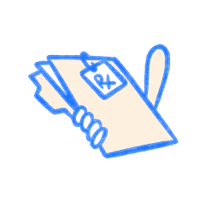Everyone knows preparing to take an exam can be both stressful and anxiety-provoking. Preparing to take the Certified Registered Nurse Anesthetist (CRNA) boards is certainly no exception.
Who Takes the CRNA Exam?
CRNAs come to their board exam with a wealth of experience: many hours of diligent studying for the boards, years spent completing a rigorous academic study program (usually two to four years), and the required clinical experience (the average CRNA completes over 9,000 clinical hours during a CRNA program).
Over 49 million anesthetic agents are administered by CRNAs each year. As the primary providers of anesthesia services in hospitals and other healthcare facilities, certification standards for CRNAs need to be both comprehensive and strict to ensure that the CRNA is knowledgeable and up-to-date on current anesthesia practices.
As a result, the CRNA board is a challenging, complex, comprehensive examination requiring many hours of preparation.
How to Pass the CRNA
Passing the 3-hour CRNA board requires successful completion of a minimum of 100 questions (and up to 170 questions) across four subject areas:
- Basic Sciences (20%)
- Equipment, Instrumentation and Technology (20%)
- General Principles of Anesthesia (35%)
- Anesthesia for Surgical Procedures and Special Population (25%)
These four key subject areas are further broken down into multiple areas of more specific subject content. For example, included within the “basic sciences” section are questions about anatomy, physiology, pathophysiology, pharmacology, applied chemistry, biochemistry, and physics.
While there is no time limit per question, board questions cannot be left unanswered, nor can the test-taker return to a question once he or she has chosen an answer and moved on to the next one.
As evidenced by the 55,700 CRNAs currently practicing across the United States (U.S.) and the 3,000-plus new CRNA candidates who enroll in CRNA programs within the U.S. each year, this certification is worth the effort.
Tips from the Inside
Jennifer, a veteran CRNA, agreed to speak with me about her experience taking the CRNA board. She’s currently preparing to recertify, a regular requirement for all practicing CRNAs, by sitting for the Continued Professional Certification (CPC) assessment. The CPC is also overseen by the NBCRNA and is a modified and abbreviated version of the initial CRNA board.
Jennifer first took the CRNA board in 2004 after completing CRNA school. While she felt her CRNA education provided her with a “firm foundation in all the important anesthesia concepts,” she recognized there was a need for additional study tools to complete the CRNA board exam successfully.
She explained that exclusive, focused studying for the boards is “imperative” to pass the exam.
Prior to today’s easy access to online study programs, many CRNA board candidates opted to attend in-person review classes, and Jennifer was no exception. “I remember I took the Valley Anesthesia Review Course to prepare for the boards” in 2004, Jennifer shared.
Completion of this program added to her knowledge, but she knew she needed more than just the program to prepare for the boards.
“After completing the course, I buckled down and focused specifically on the four sections for about four straight weeks . . . and then took my boards.”
How to Study
As she prepares today to sit for the CPC assessment, Jennifer’s experience parallels that of many of today’s CRNA candidates who opt to use a combination of study methods when preparing to take the CRNA board exam. Her study methods include:
- Online CRNA practice exam question banks
- In-person review classes
- Participation in study groups
- Textbook review
Working on improving her test-taking skills was another area Jennifer focused on in preparation for her initial CRNA board exam back in 2004. Because Jennifer took the time to study efficiently and effectively, she was not surprised by the material that was presented on the exam itself. She said the surprise came, “by all the different ways the material can be presented.”
What is the Test Like?
According to the NBCRNA website, candidates preparing to take the CRNA board should be prepared to answer questions presented across several item types:
- Multiple-choice
- Multiple correct response
- Math calculation style questions
- Using a drag-and-drop modality to place answers in correct order or complete a matching exercise
- Watching videos or interpreting data presented in graph format as components of question format
What are the Most Difficult Areas?
I asked Jennifer if she could remember what questions on the initial CRNA board exam were the most difficult for her in 2004. She said the questions about anesthesia equipment and technology were the most challenging.
This section of the board exam compromises about 15% of the questions on the exam and includes knowledge of anesthetic delivery systems, airway equipment, monitoring devices and imaging.
General principles of anesthesia is a subject area with a wide range of material. There are fourteen subcategories within this section. Topics in this category range from ethical considerations and legal issues to positioning a surgical patient, fluid volume management, and preoperative assessment of the patient.
One plus in this section, Jennifer noted is, “the airway management section of the exam was the easiest for me, as this is something that a nurse anesthetist focuses on daily in the profession.”
Then and Now: What Worked?
I asked Jennifer to look back at her experience taking the board the first time and consider how she might prepare differently.
And of the classmates she had who did not pass the board exam the first time, she emphatically stated, “One hundred percent passed on the second try” when they “focused studying for the boards exclusively by itself.” Jennifer repeated this sentiment as she left me with these words of wisdom to share with prospective CRNAs:
“Take the time to study separately and exclusively for the boards . . . brush up on actual test-taking skills . . . Then you should have success passing your boards to be a CRNA!”


